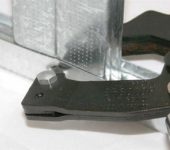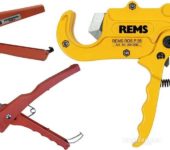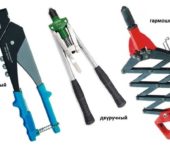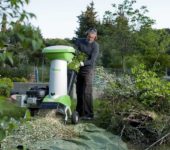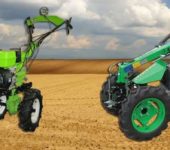Homemade sheet bending machines (sheet bending machines)
A lot of products are made of sheet metal - drainage systems, shaped parts for cladding roofs covered with corrugated board or metal tiles, ebbs for the basement, corners for structures made of profiled sheet, etc. All this can be done by a special bending machine - for sheet metal. How to make a do-it-yourself bending machine and let's talk in this article.
The content of the article
Types of bending machines
There are three types of plate bending machines:
- Simple manual, metal bending in which occurs when force is applied in a certain place. These units make it possible to bend sheet material in a straight line at any angle - from a few degrees to almost 360 °.
- Hydraulic machines in which sheet metal is bent into a matrix by means of impact. The matrix can be straight or curved. This equipment is professional, used at enterprises of medium and large capacity.
- Roller or roller bending machines. In them, the sheet of metal is not bent in a straight line, but is rounded. With this equipment, you can make pipes yourself or other similar products.
All these devices are referred to as bending machines. It is easiest to make a unit of the first group with your own hands, and the third (rolls for sheet metal) is a little more difficult. Let's talk about them - from how to make a do-it-yourself bending machine.
Simple manual
Shaped metal parts cost a lot of money. Even more than corrugated board or metal tile, therefore it makes sense to make the simplest machine for bending sheet metal, and with its help to make as many corners, ebb and flow and other similar parts as you need, and exclusively for your size.
- Sheet metal bending machine drawing
- Listogib - side projection
- Another model
If you're worried about appearance, then in vain. On sale today there is sheet metal not only galvanized, but also painted. In all structures, the sheet is fixed tightly, so that it does not slip on the table during work, which means that the paint is not erased or scratched. In places of bending, it is also not damaged. So the products will look quite decent. If you try, it will look even better than what is being sold on the market.
Powerful listogib made of Taurus
This bending machine will require a flat surface (table), preferably metal, three corners with a shelf width of at least 45 mm, and a metal thickness of at least 3 mm. If you plan to bend long workpieces (more than a meter), it is advisable to take the shelves wider and the metal is thicker. You can use brands, but this is for bending metal sheets of large thickness and length.
You will also need metal door hinges (two pieces), two large-diameter screws (10-20 mm), "lambs" on them, a spring. You will also need a welding machine - weld the hinges and make holes (or a drill with a drill for metal).
For a homemade listogib, a 70 mm Tavr was used - three pieces of 2.5 m each, two bolts 20 mm in diameter, a small piece of metal 5 mm thick (for cutting jibs), a spring. Here is the procedure:
- Two brands are folded, from both ends they cut out recesses in them under the hinges. The edges of the recesses are beveled at 45 °. The third brand is cut in the same way, only the depth of the groove is made a little more - this will be a clamping bar, so that it should move freely.
- Loops are welded on both sides (boil from the face and from the inside out).
- To one of the brands (farthest from you, if they are "open"), two jibs are welded on each side. They are needed so that you can install the clamping plate bolt on them.
- Weld the bolt nut to the jibs.
- Install the clamping bar (third cut tee), weld metal plates in the upper part with a hole in the middle. The hole diameter is slightly larger than the bolt diameter. Center the holes so that they are on the same vertical line with the welded nut. Weld.
- Cut the spring so that it raises the clamping bar by 5-7 mm. Pass the bolt into the "ear" of the clamping bar, put on the spring, tighten the nut. After installing the same spring on the other side, the clamping bar rises itself when unscrewed.
- Weld two pieces of reinforcement to the screw head - as handles for tightening.
- Weld the handle to the movable (closest to you) brand. Everything, you can work.
This option is very powerful - you can bend long workpieces and a sheet of solid thickness. This scale is not always in demand, but you can always reduce it. The video suggests a similar smaller design, but with a different clamping bar mount. By the way, no one bothers to install a spring on the screw too - it will be easier to raise the bar. And this design is interesting in that it is possible to make flanging on it, which usually such devices do not know how.
From a corner with a different type of clamping bar
This model is welded from a thick-walled corner, the bed is made like a regular construction trestle, which is welded from the same corner. The handle is from the luggage trolley. An interesting design of the screws - they are long, the handle is bent in the shape of the letter "L". Convenient to twist / unscrew.
This DIY sheet metal bending machine has many features:
- The corners are not arranged in shelves towards each other, but directed in one direction. Because of this, fastening the loop is not the most convenient, but you can do it.
- At the bend of the far (fixed) corner, small stop plates for the clamping bar are welded on both sides.
- The nut from the screw is welded on the same bar (on both sides).
Now let's move on to the design of the pressure plate (pictured above). It is also made of a corner, but fits onto the machine with an upward bend. In order to prevent the bar from bending during operation, reinforcement is welded on - metal jumpers. Small metal pads are welded at both ends of the strip, in which holes for bolts are drilled.
Another important point is that the face that faces the bend is cut off to obtain a sharper bend angle.
The clamping bar is placed on the machine, a spring is placed in the place where the nut is installed. The handle is put in place. If it does not press the bar, it is raised above the surface due to the spring force. In this position, the workpiece is tucked under it, exposed, pressed.
Not a bad option for home use. It will not be possible to bend thick metal, but tin, galvanized steel is easy.
Rolls for sheet metal or roll bending machine
This type of bending machine can have three types of drive:
- manual;
- hydraulic;
- electric.
Do-it-yourself rolls for sheet metal with manual or electric drive. In manual ones, they put 3 shafts, in electric ones, there can be 3-4, but usually also three.
This machine needs a good, reliable base. It can be a separate bed or some kind of workbench or table. The design is based on rolls. They are made the same size.The two lower ones are installed permanently, the upper one is movable, so that in the lower position it is located between the rollers. By changing the distance between the lower rollers and the upper one, the radius of curvature changes.
The machine is set in motion using a handle attached to one of the shafts. The torque is then transmitted to the other rollers via sprockets. They are selected so that the rotation speed is the same.
If it is supposed to make pipes on the equipment, the upper roller on one side is made removable, with a quick fixing system. Having rolled the sheet into a tube, there is no other way to pull it out.




















